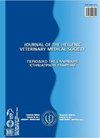Effects of dietary aspirin supplementation on liver enzymes, immune response, cecum microflora and fatty acids profile in breast meat of broiler chickens
IF 0.4
4区 农林科学
Q4 VETERINARY SCIENCES
引用次数: 0
Abstract
The present study was performed to investigate the effect of dietary aspirin (A) on broilers. A completely randomized design using 120 one-day-old male broiler chicks Ross 308, three levels of aspirin (0, 50, and 100 mg/kg) was used in 4 replicates, each including 10 chicks, during 42 days. The effects of different levels of aspirin, added to a basal diet, on blood plasma parameters, liver enzymes, immune system, cecal microflora, and fatty acids profile of breast muscle of chicks were investigated. Data analysis was performed by SAS statistical software and the comparison of the means with Duncan's test. The results showed that the effects of aspirin on blood parameters, liver enzymes of broilers (except for alkaline phosphatase which significantly reduced), the humoral immune system in response to antigen injection as sheep red blood cell (SRBC), antibody titer against Newcastle and influenza virus were not significant (P≥0.05). The highest percentage of neutrophils and eosinophils was related to this treatment. Also, aspirin treatments increased numerically the levels of unsaturated fatty acids and decreased saturated fatty acids. Moreover, aspirin led to a reduction in the population of Escherichia coli. So, based on the results of the present study, the use of 100 mg/kg aspirin in the diet of broilers is recommendable.日粮补充阿司匹林对肉鸡胸肉肝酶、免疫反应、盲肠菌群和脂肪酸组成的影响
本试验旨在探讨饲粮中添加阿司匹林(A)对肉仔鸡的影响。试验采用完全随机设计,选取120只1日龄的罗斯308雄性肉鸡,分4个重复,每重复10只鸡,分别饲喂3种水平的阿司匹林(0、50和100 mg/kg),试验期42 d。研究了基础饲粮中添加不同水平阿司匹林对雏鸡血浆参数、肝酶、免疫系统、盲肠菌群和胸肌脂肪酸谱的影响。数据分析采用SAS统计软件,均数与Duncan检验比较。结果表明:阿司匹林对肉仔鸡血液指标、肝酶(除碱性磷酸酶显著降低外)、抗原注射后的体液免疫系统(如羊红细胞)、新城疫抗体效价和流感病毒抗体效价均无显著影响(P≥0.05)。中性粒细胞和嗜酸性粒细胞的最高百分比与这种治疗有关。此外,阿司匹林治疗在数值上增加了不饱和脂肪酸的水平,减少了饱和脂肪酸。此外,阿司匹林还能减少大肠杆菌的数量。因此,根据本研究结果,推荐在肉仔鸡饲粮中使用100 mg/kg阿司匹林。
本文章由计算机程序翻译,如有差异,请以英文原文为准。
求助全文
约1分钟内获得全文
求助全文
来源期刊

Journal of the Hellenic Veterinary Medical Society
VETERINARY SCIENCES-
CiteScore
0.60
自引率
0.00%
发文量
83
审稿时长
>12 weeks
期刊介绍:
The Journal of the Hellenic Veterinary Medical Society (J Hellenic Vet Med Soc) is a quarterly peer-reviewed journal that publishes articles in all aspects of veterinary science and related disciplines. It is published by the Hellenic Veterinary Medical Society and is indexed in the Web of Science and in Scopus.
There are no publication fees in the journal. Authors considering submitting manuscripts for evaluation and publication are requested to read carefully the instructions for authors and fully comply with them.
Non-complying manuscripts may be returned to the corresponding author for formatting.
 求助内容:
求助内容: 应助结果提醒方式:
应助结果提醒方式:


